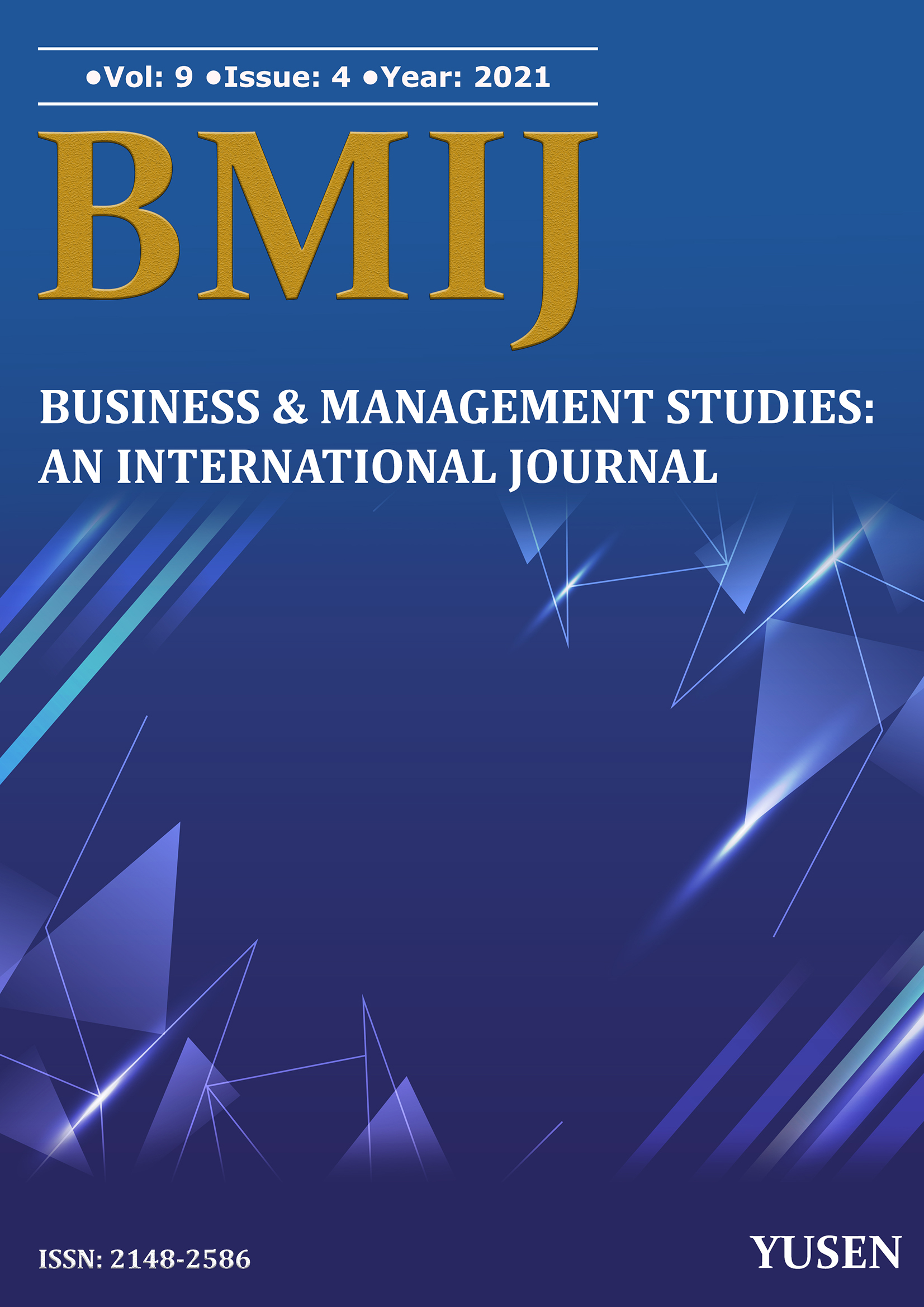
Published 2021-12-25
How to Cite
Copyright (c) 2021 Kenan Güllü- Süreyya Akçay

This work is licensed under a Creative Commons Attribution-NonCommercial-NoDerivatives 4.0 International License.
Abstract
As web technologies become widespread, accommodation businesses can share experiences that will cause their guests to complain online. Experiences in applications in line with the COVID-19 outbreak and the measures taken by countries are also included in e-complaints. The aim of this study; Classification the e-complaints made by the guests of the accommodation businesses operating on a global scale and determine the e-complaints of the hotel guests in the COVID-19 process. In the research, 366 e-complaint comments of Antalya, Ankara, Istanbul, Izmir, Muğla hotel guests on the Hospitality ON-2019 Top 10 hotel list operating in Turkey Tripadvisor website were analysed by content analysis. The data were processed into forms for the content analysis, transferred to electronic increments, analysed, and visualized. As a result of the research, e-complaints of hotel guests are classified into six main categories and 26 sub-categories as general, restaurant and food and beverage, rooms, front desk, service quality and management. It has been determined that e-complaints are primarily concentrated in public, restaurant and food and drink, rooms, front office, service quality and control.
Downloads
References
- Aydın, B., & Doğan, M. (2020). Yeni koronavirüs (covıd-19) pandemisinin turistik tüketici davranışları ve Türkiye turizmi üzerindeki etkilerinin değerlendirilmesi. Pazarlama Teorisi Ve Uygulamaları Dergisi, 6(1), 93-115.
- Ayyıldız, A. Y., & Baykal, M. (2020). Otel işletmelerine yönelik e-şikâyetlerin içerik analizi ile incelenmesi: Kuşadası 5 yıldızlı otel işletmeleri örneği. OPUS Uluslararası Toplum Araştırmaları Dergisi, 16(30), 2659-2683.
- Baltacı, A. (2018). Nitel araştırmalarda örnekleme yöntemleri ve örnek hacmi sorunsalı üzerine kavramsal bir inceleme. Bitlis Eren Üniversitesi Sosyal Bilimler Enstitüsü Dergisi, 7(1), 231-274.
- Bozok, D., Güven, Ö. Z. Ve Ceylan, U. (2014). Termal Konaklama İşletmelerinde Müşteri İlişkileri Yönetimi (Crm) Üzerine Bir Araştırma: Frigya Bölgesi Örneği. Dumlupınar Üniversitesi Sosyal Bilimler Dergisi, 41(41), 131-140.
- Buhalis, D., & Law, R. (2008). Progress in information technology and tourism management: 20 years on and 10 years after the internet-the state of etourism research. Tourism Management, 29(4), 609–623.
- Chhabra, D (2020). Transformatıonal wellness tourism system model in the pandemic era. International Journal of Health Management and Tourism, 5(2), 76-101.
- Demir, M., Günaydın, Y., & Demir, Ş. Ş. (2020). Koronavirüs (covid-19) salgınının türkiye'de turizm üzerindeki öncülleri, etkileri ve sonuçlarının değerlendirilmesi. International Journal Of Social Sciences And Education Research, 6(1), 80-107.
- Dinçer, M. Z., & Alrawadieh, Z. (2017). Negative word of mouse in the hotel industry: a content analysis of online reviews on luxury hotels in Jordan. Journal of Hospitality Marketing & Management, 26(8), 785-804.
- Dünya Turizm ve Seyahat Konseyi (WTTC), 2020, Latest research from wttc shows a 50% increase in jobs at risk in travel & tourism. Https://Wttc.Org/News-Article/Latest-Research-From-WTTC-Shows-A-50-Percentage-İncrease-İn-Jobs-At-Risk-İn-Travel-Andtourism#:~:Text=The%20latest%20projection%20of%20a,Effect%20of%20the%20coronavirus%20pandemic. Erişim: 03.12.2020.
- Efendi, M. (2021). Çeşme’de Bulunan Küçük Ölçekli Konaklama Tesisleri; Covid-19 Süreci ve EŞikayetlerin İncelenmesi. Türk Turizm Araştırmaları Dergisi, 5(1), 103-118.
- Fernandes, T., & Fernandes, F. (2018). Sharing dissatisfaction online: Analyzing the nature and predictors of hotel guests negative reviews. Journal of Hospitality Marketing & Management, 27(2), 127-150.
- Gössling, S., Scott, D., & Hall, C. M. (2020). Pandemics, tourism and global change: a rapid assessment of covıd-19. Journal Of Sustainable Tourism, 29:1, 1-20.
- Gretzel, U., Fuchs, M., Baggio, R., Hoepken, W., Law, R., Neidhardt, J., Personen, J., Zanker, M., & Xiang, Z. (2020). E-tourism beyond covıd-19: a call for transformative research. Information Technology & Tourism, 22:187–203.
- Hall, C. M., Scott, D., & Gössling, S. (2020). Pandemics, transformations and tourism: be careful what you wish for. Tourism Geographies, 22:3, 1-22.
- Higgins-Desbiolles, F. (2020). Socialising tourism for social and ecological justice after covıd-19. Tourism Geographies, 22:3, 1-14.
- HHTL (Horwath Hotel Tourism and Leisure, 2019). Türkiye zincirler ve oteller Raporuhttps://Horwathhtl.Com.Tr/Wpcontent/Uploads/Sites/10/2019/03/HHTL_T%C3%Bcrkiye_Raporu_2019.Pdf, (Erişim:06.12.2020).
- Hospitality-ON Oteller (2019). Küresel otel sıralaması 2019: Sektörün süper büyükleri kimler?.Https://Hospitality-On.Com/En/Hotel-Ranking/Global-Hotel-Ranking-2019-Who-Are-İndustrys-Supermajors. Erişim: 02.12.2020.
- İçişleri Bakanlığı (2021). 1 Temmuz Sonrası Ülkeye Giriş Tedbirleri Genelgesi. https://www.icisleri.gov.tr/1-temmuz-sonrasi-ulkeye-giris-tedbirleri-genelgesi. Erişim: 29.06.2021.
- Kvirkvelia, N., & Tsitsagi, M. (2021). Impact of Covid-19 on tourism in Georgia-an overview. Georgian Geographical Journal, 1(1), 27-33.
- Karagöz, Y. (2017). SPSS ve AMOS uygulamalı nicel-nitel-karma bilimsel araştırma yöntemleri ve yayın etiği. Ankara: Nobel Yayın.
- Levy, S. E., Duan, W., & Boo, S. (2013). An analysis of one-star online reviews and responses in the Washington, DC, Lodging Market. Cornell Hospitality Quarterly, 54(1), 49-63.
- Nazlı, M. (2020). Tourists’e-complaints about online travel agencies. Safran Kültür ve Turizm Araştırmaları Dergisi, 3(1), 99-111.
- Sahin, I., Gulmez, M., & Kitapci, O. (2017). E-complaint tracking and online problem-solving strategies in hospitality management: plumbing the depths of reviews and responses on Tripadvisor. Journal of Hospitality and Tourism Technology.8 (3), 372-394.
- Sparks, B., & Browning, V. (2010). Complaining in cyberspace: the motives and forms of hotel guests’ complaints online. Journal of Hospitality Marketing & Management, 19 (7), 797 818.
- Sparks, B. A., So, K. K. F., & Bradley, G. L. (2016). Responding to negative online reviews: the effects of hotel responses on customer inferences of trust and concern. Tourism Management, 53, 74-85.
- Rogerson, C. M., & Rogerson, J. M. (2020). COVID-19 Tourism impacts in South Africa: Government and industry responses. GeoJournal of Tourism and Geosites, 31(3), 1083-1091.
- Türkiye Otelciler Birliği (TÜROB, 2020). Corona virüs (covid-19) tedbirlerinden etkilenen mükelleflere sağlanan imkânlara ilişkin özet tablo. Http://Www.Turob.Com/Tr/Haberler/Corona-Virus-Covid-19-Tedbirlerinden-Etkilenen-Mukelleflere-Saglanan-İmkanlara-İliskin-Ozet-Tablo. Erişim: 03.12.2020.
- Türkiye Otelciler Birliği (TÜROB, 2021). Yabancı turistler sokağa çıkma kısıtlamasından muaf tutulacaktır. http://www.turob.com/tr/haberler/yabanci-turistler-sokaga-cikma-kisitlamasindan-muaf-tutulacaktir. Erişim: 17.06.2021.
- UNWTO (2020). UNWTO World tourism barometer, Vol 18(2). UNWTO, Madrid.
- Yıldırım, A., & Şimşek, H. (2013). Sosyal bilimlerde nitel araştırma yöntemleri (9. Baskı). Ankara: Seçkin Yayınları.
- Zengin, B., & Haliloğlu, S. (2020). Konaklama işletmelerine yönelik e-şikâyetlerin incelenmesi: Sakarya örneği. Safran Kültür Ve Turizm Araştırmaları Dergisi, 3(1), 68-84.


